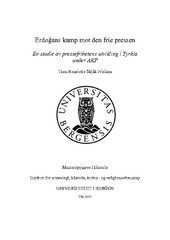Erdogans kamp mot den frie pressen: En studie av pressefrihetens utvikling i Tyrkia under AKP
Master thesis
Permanent lenke
https://hdl.handle.net/1956/16606Utgivelsesdato
2017-06-17Metadata
Vis full innførselSammendrag
The freedom of the press in Turkey saw new and different challenges in the period between 2002-2015, following the decisive 2002 election victory of the Justice and Development Party (AKP), which has been in power ever since. For decades, the country had been criticized for a high number of imprisoned journalists. Since 2002 the number of imprisoned journalists continued to rise and the Turkish media has been subjected to an ever-increasing government pressure. During the first years of AKP rule, Turkey experienced relatively rapid economic growth and increasing political stability. In hope of gaining membership in the European Union the AKP pursued further democratization of the country. Among the EU entry requirements was an improvement in the poor conditions of the freedom of press. Turkish mass media was already marked by a strong patron-client relationship, due to the conglomeration of the media in the 1980s. In recent years AKP has shifted to a more authoritarian style of rule, with a strong impact on democratic processes. The latter end of the period has seen severe informal restrictions on journalistic freedom. By the end of 2015 large parts of Turkish media was under government control. Turkish media have since the 1980s operated under a polarized and politicized structure were professional solidarity have been absent. The media have found it difficult to mobilize as a united front against the increased government pressure under AKP’s rule. How did a divided media community respond to increased government pressure? Has the media been silenced or did the increased pressure also result in a growing resistance? How did the impact of other developments in Turkish civil society influence the media? This thesis is a study of English-language Turkish media from the period, and provides an analysis of the development of press freedom in Turkey in the 2002-2015 period.
